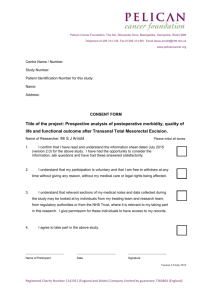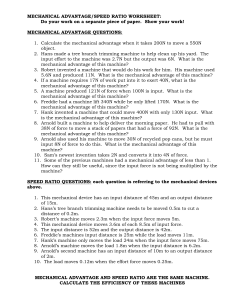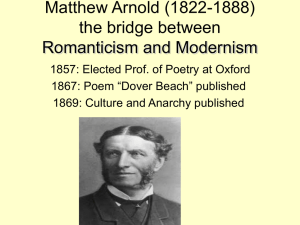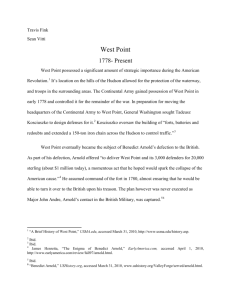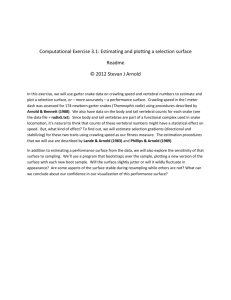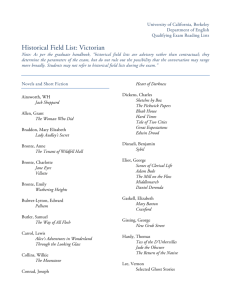Arnold
advertisement
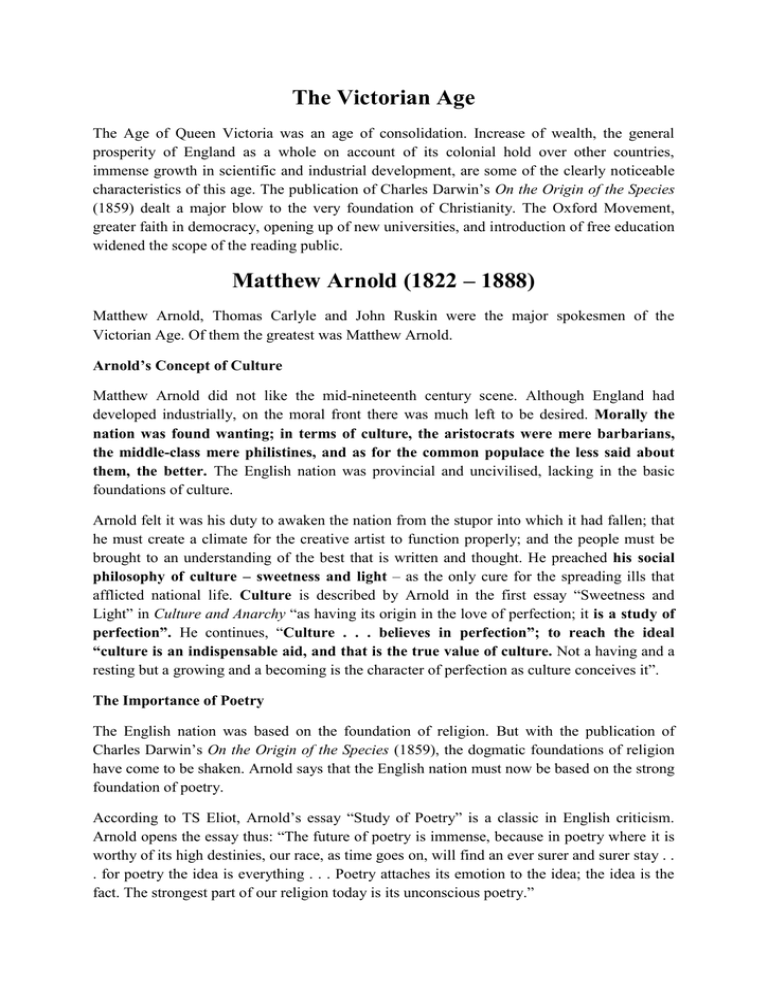
The Victorian Age The Age of Queen Victoria was an age of consolidation. Increase of wealth, the general prosperity of England as a whole on account of its colonial hold over other countries, immense growth in scientific and industrial development, are some of the clearly noticeable characteristics of this age. The publication of Charles Darwin’s On the Origin of the Species (1859) dealt a major blow to the very foundation of Christianity. The Oxford Movement, greater faith in democracy, opening up of new universities, and introduction of free education widened the scope of the reading public. Matthew Arnold (1822 – 1888) Matthew Arnold, Thomas Carlyle and John Ruskin were the major spokesmen of the Victorian Age. Of them the greatest was Matthew Arnold. Arnold’s Concept of Culture Matthew Arnold did not like the mid-nineteenth century scene. Although England had developed industrially, on the moral front there was much left to be desired. Morally the nation was found wanting; in terms of culture, the aristocrats were mere barbarians, the middle-class mere philistines, and as for the common populace the less said about them, the better. The English nation was provincial and uncivilised, lacking in the basic foundations of culture. Arnold felt it was his duty to awaken the nation from the stupor into which it had fallen; that he must create a climate for the creative artist to function properly; and the people must be brought to an understanding of the best that is written and thought. He preached his social philosophy of culture – sweetness and light – as the only cure for the spreading ills that afflicted national life. Culture is described by Arnold in the first essay “Sweetness and Light” in Culture and Anarchy “as having its origin in the love of perfection; it is a study of perfection”. He continues, “Culture . . . believes in perfection”; to reach the ideal “culture is an indispensable aid, and that is the true value of culture. Not a having and a resting but a growing and a becoming is the character of perfection as culture conceives it”. The Importance of Poetry The English nation was based on the foundation of religion. But with the publication of Charles Darwin’s On the Origin of the Species (1859), the dogmatic foundations of religion have come to be shaken. Arnold says that the English nation must now be based on the strong foundation of poetry. According to TS Eliot, Arnold’s essay “Study of Poetry” is a classic in English criticism. Arnold opens the essay thus: “The future of poetry is immense, because in poetry where it is worthy of its high destinies, our race, as time goes on, will find an ever surer and surer stay . . . for poetry the idea is everything . . . Poetry attaches its emotion to the idea; the idea is the fact. The strongest part of our religion today is its unconscious poetry.” As the foundations of religion have come to be shaken, poetry alone can provide selfassurance and nourishment to mankind. The Touchstone Method The term touchstone was introduced into literary criticism by Matthew Arnold in “Study of Poetry” to denote short but distinctive passages, selected from the writing of great poets, which he used to determine the excellence of passages or poems which are compared to them. As Arnold puts it, “There can be no more useful help for discovering what poetry belongs to the class of the truly excellent . . . than to have always in one’s mind lines and expressions of the great masters, and to apply them as a touchstone to other poetry.” He quotes eleven passages, three from Homer, three from Dante, three from Milton, and two from Shakespeare; all of them have a tone of melancholy about them. Lines of intense poetic quality must be treasured by us, and kept well in our minds as guiding touchstones to great poetry. This concept has aroused a lot of controversy. However, we must realise that Arnold did not wish his touchstones to be compared unimaginatively with some other passages of other poets. On the flip side, the touchstones have only a short range. Single passages do not prove his theory. Great authors and centuries of national traditions cannot be represented in a line or two. Such a game, for Rene Wellek, is not worth the candle. The touchstone method runs counter to the principle of totality in a work. Arnold’s Concept of ‘Truth and High-Seriousness For Matthew Arnold, poetry that does not possess ‘truth and high-seriousness cannot be ranked as great poetry. “The best poetry is what we want; the best poetry will be found to have a power of forming, sustaining and delighting us, as nothing else can”. He denies greatness to Chaucer and Burns because they lacked truth and high seriousness of the classics. This shows that Arnold had a rather narrow conception of poetry. His Views on the English Romantic Poets Arnold rated the English Romantics very low in comparison with their continental counterparts. The English poetry of the first quarter of the 19th century “did not know enough. This makes Byron so empty of matter, Shelley so incoherent, Wordsworth . . . wanting in completeness and variety.” He called Shelley a “beautiful and ineffectual angel beating in the void his luminous wings in vain”. Coleridge for him was a “poet and philosopher wrecked in the mist of opium”. The letters of Keats were the “love-letters of a surgeon’s apprentice”. The Romantic Movement in England did not possess the glow of life that Elizabethan society had. Hence the movement was poor and premature. Alas! Arnold’s judgement appears far too unfair and even prejudiced. “The Function of Criticism at the Present Time"/Disinterestedness The essay “The Function of Criticism at the Present Time” was published in the National Review in1864. Arnold’s disinterestedness does not mean an art for art’s sake attitude. Arnold asks the critic to steer clear of the practical and political considerations. He says “And how is criticism to show its disinterestedness? By keeping aloof from practice; by resolutely following the law its own nature . . . by steadily refusing to lend itself to any of those ulterior, political, practical considerations . . . Its business is to know the best that is known and thought in the world, and by in its turn making this known, to create a current of true and fresh ideas”. The two well-known custodians of the consciousness of the people, The Edinburgh Review and the Quarterly Review were in the service of the Whigs and the Tories respectively. Hence, Arnold’s insistence on the need for good criticism to create “a current of true and fresh ideas”. Critical activity is essentially disinterested. In the essay, Arnold says that for good literature to flourish, two powers are necessary – the creative and the critical. While the critical power is of a lower order than the creative, it is this power that affords the intellectual stimulation of which the creative power can avail itself profitably. The critical power establishes an order of new ideas, or at least makes the best ideas prevail. Out of these fresh ideas, creative epochs are born. Why did Arnold exclude the poem “Empedocles on Etna” from his collection Poems? Arnold excluded from his collection Poems “Empedocles on Etna”, a dramatic poem in which the Greek philosopher, disillusioned with life, throws himself into the crater of Etna. Arnold was of the opinion that tragic circumstances should be so represented as to be enjoyable. He felt that circumstances in which “suffering finds no vent in action” are not to be treated as subjects for good poetry. Arnold is a propagandist for criticism, says TS Eliot. Arnold uses the term ‘architectonic with reference to Paradise Lost and King Lear. The first prose work of Arnold was the Preface to the Poems of 1853. In his prose works, he tried to justify himself as a poet. Watson says that Arnold was an “adapter rather than a coiner of terms”. His idea of the function of criticism is borrowed from Sainte–Beuve, “philistine” from German and “sweetness and light” from Jonathan Swift. Arnold considered both literature and religion as two indivisible parts of culture. H W Garrod calls Arnold’s tone “High-Church ceremonial”. Arnold defines literature as “a criticism of life”.
